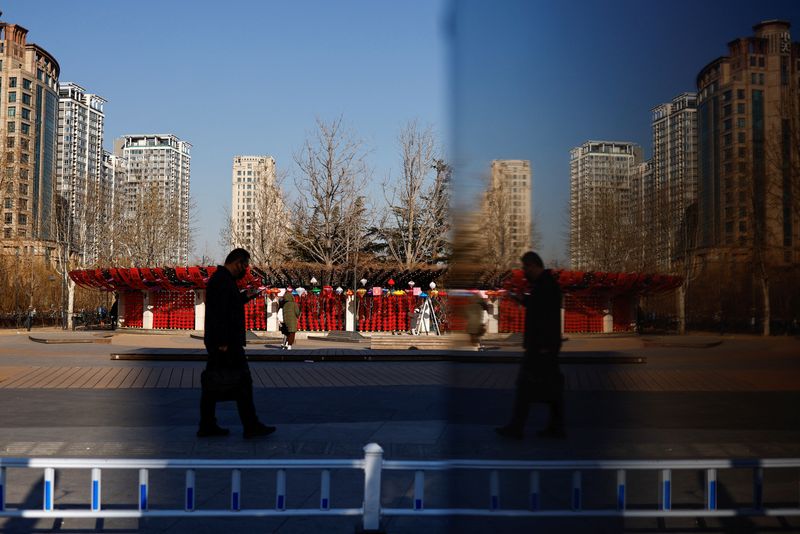By Kevin Yao
BEIJING (Reuters) - China's policymakers plan to step up support for domestic demand this year but are likely to stop short of splashing out big on direct consumer subsidies, keeping their focus mainly on investment, three sources close to policy discussions said.
In recent weeks, top policymakers have repeatedly signalled their intention to harvest the spending power of China's 1.4 billion people, after economic growth in 2022 slumped to one of its weakest levels in nearly half a century.
That has raised expectations that hefty household stimulus measures could be announced at a parliament meeting in March. Prominent academics have felt emboldened to speak publicly about sizeable demand-side measures such as 1 trillion yuan ($148.28 billion) or more in consumption vouchers.
Sources close to the policy discussions, however, told Reuters they expect China to stick more closely to its familiar playbook of policies to support key industries and splurge on infrastructure, aiming to shore up jobs and incomes and eventually lift consumer sentiment off record lows.
"There are limited options to stimulate consumption," said one insider, who like the other sources spoke on condition of anonymity due to the sensitivity of policy debates. "The possibility of giving cash handouts is small."
The National Development and Reform Commission, the top state planner, did not immediately respond to a request for comment.
Last year was dismal for Chinese consumers, who bore the brunt of harsh COVID-19 curbs that were abruptly lifted in December. Retail sales fell 0.2%, the second worst performance since 1968, while per capita disposable income rose just 2.9%, the second smallest rise since 1989.
REBALANCING OVERDUE
Many economists have argued for years that the world's No. 2 economy should rebalance, relying more on domestic consumption and reducing its reliance on debt-backed investment, which now produces more debt than growth.
Reviving consumer demand quickly is even more critical for a convincing economic recovery this year -- the country's exports are faltering amid a global slowdown and the crisis-hit property market is struggling.
But policymakers' apparent reluctance to veer too swiftly, or too far, from their old playbook highlights the difficulty of realigning the $18 trillion economy.
Since the Communist Party's Central Economic Work Conference in December, top policymakers have repeated their intention to boost consumers' spending power, without saying how.
President Xi Jinping said on Wednesday that China should take steps so that consumers "dare to spend without worrying about the future."
World Bank data shows investment as a share of China's GDP is almost 20 percentage points above the global average, while household consumption is almost 20 points below, a greater imbalance than Japan's in the 1980s, before its long stagnation.
(Graphic: China's investment share of the economy is among the highest in the world, https://fingfx.thomsonreuters.com/gfx/mkt/egvbkzlkepq/Pasted%20image%201664956927917.png)
MUST 'GUARANTEE' GROWTH
Change is easier said than done.
Chinese leaders have signalled their intention to boost domestic consumption many times in the past decade, without much follow-through.
Policymakers worry that large cash handouts would worsen wealth inequality, lower productivity and fan inflation, said the sources involved in internal policy discussions.
"The government prefers to invest and launch projects," said Guo Tianyong at Beijing's Central University of Finance and Economics.
Given such concerns, arguments for Beijing-funded consumer vouchers in excess of 1 trillion yuan made by influential academics such as Yao Yang, dean of the National School of Development at Peking University, or for bolstering China's barely noticeable social safety net, are losing ground.
Advisers to Chinese policymakers worry that weakening demand in the West is endangering manufacturing jobs. They argue that a range of industries, including emerging technologies such as AI, require support and that infrastructure spending needs to continue if youth unemployment is to be brought down from near-record levels.
“We must guarantee economic growth of above 5% this year. If economic growth revives, companies will have money and people will have jobs and incomes," said an adviser to the cabinet.
The government is expected to widen its budget deficit to around 3% of GDP this year to accommodate those spending needs, insiders said, adding to overall debt.
Some analysts say pent-up demand during the pandemic may be enough for consumption to grow with little policy support. Household savings jumped 7.9 trillion yuan last year to 17.8 trillion yuan.
Tesla Inc (NASDAQ:TSLA) said on Friday that its January China sales rose 18% from December, spurred by price cuts last month, and it is planning to step up production at its Shanghai plant.
But other market watchers warn that a large share of the rise in deposits may be explained by consumers' safety-first reallocations into bank deposits and that many such deposits have long-term maturities.
"The increased household deposits in China are unlikely to be fully transmitted to private consumption," ANZ economists wrote.
(Graphic: Chinese household consumption's share of GDP is one of the lowest in the world, https://fingfx.thomsonreuters.com/gfx/mkt/klvykxmkovg/Pasted%20image%201664957180429.png)
LEAVE IT TO LOCAL GOVERNMENTS
Consumption-boosting policies still have their place on the agenda, but they are likely to be local and modest, government advisers said.
Several Chinese cities have already offered about 5 billion yuan in consumption vouchers and subsidies in total since December. The Jiangsu provincial government has pledged to subsidize shopping festivals, while other jurisdictions have promised to subsidize purchases of electric vehicles or senior care, local media reported.
“Calls for issuing consumption vouchers and direct subsidies are growing, but we should let local governments to do the job based on local conditions,” said a third source close to policy discussions.
($1 = 6.7440 Chinese yuan renminbi)
